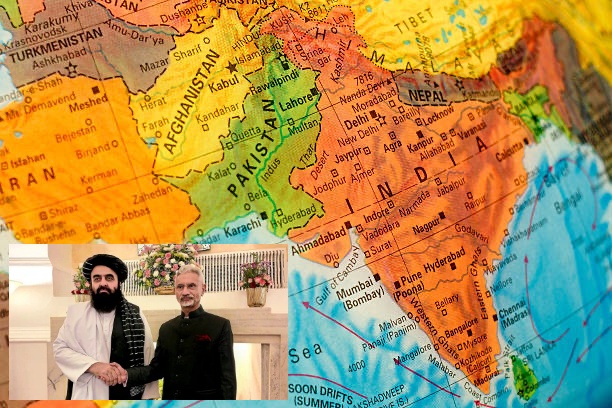Regimes are temporary, geography is permanent: Why India needs to play the Great Game, and engage with Taliban, or whoever holds power in Afghanistan
India hosted Taliban foreign minister Amir Khan Muttaqi in Delhi last week, and a lot of people, politicians, journalists, and social media users had a meltdown. The Opposition saw an opportunity when there was a social media buzz that the Taliban press conference inside the Afghan Embassy ‘excluded’ women journalists. Rahul Gandhi and his sister joined in to attack the Modi government for ‘allowing’ the exclusion, ignoring the fact that the government of India does not, and should not, interfere in the administrative affairs of a foreign embassy. Then there was the outrage of women journalists, who started blaming the government of India for welcoming the Taliban, along with their practices of misogyny. The Taliban later did invite them to their presser, after clarifying that the earlier lack of invitation was due to time and number constraints, not any other reason. “What is even more ridiculous is that the Taliban FM is allowed to bring their abhorrent and illegal discrimination against women to India, as the government hosts the Taliban delegation with full official protocol. This isn’t pragmatism, this is supplication”, posted The Hindu’s Suhasini Haider. What is even more ridiculous is that the Taliban FM is allowed to bring their abhorrent and illegal discrimination against women to India, as the government hosts the Taliban delegation with full official protocol. This isn't pragmatism, this is supplication. https://t.co/0FimOp6gpH— Suhasini Haidar (@suhasinih) October 10, 2025 Muttaqi’s visit to Darul Uloom Deoband on Saturday, 11 October, triggered even the fence sitters who were yet to react over the visit. Deoband, long associated with Islamic radicalism in India and abroad, and the Taliban’s ideological alma mater, has been linked to the rise of Wahabi Sunni Islam that has become the driving force behind many militant powers, the Taliban included. Many voices in India and abroad have raised concerns over the Indian government platforming, engaging and welcoming the Taliban as the legitimate rulers of Afghanistan. For many, the very idea is jarring, to see representatives of a regime that many view as repressive, especially toward women and minorities, being treated with diplomatic courtesy. Some voices, rather emotional ones, have even argued that India should shun any formal engagement with the Taliban. Even more voices call for confrontation, at least at diplomatic levels, about their internal affairs. That moral aversion is understandable, but it must contend with the harsh arithmetic of regional security, diplomacy, and influence. Afghanistan is not today’s game. It is a game that has been afoot for centuries. India not only has a millennia-old cultural connect with the land, but also has shared border, trade routes and much more. India will always needs a good relationship with whoever is in power in Kabul, because of multiple reasons. The Great Game: Clashing of empires over influence on a coveted land The Russian Empire and the British Empire engaged in a rivalry of influence over Central Asia for decades, referred to as ‘The Great Game’ in world history. The Game stemmed from Afghanistan’s strategic location and the geopolitical ambitions of both powers. Both powers knew that they can never exert control over the vast, resource-rich landscape of Central Asia, without gaining a foothold in Kabul. Scenes from the Anglo Afghan war, image via Explorethearchive Afghanistan lies at the crossroads of Central Asia, South Asia, and the Middle East, bordering British India to the southeast, Russian-controlled Central Asia to the north, and Persia (modern Iran) to the west. It is a critical buffer zone and a potential staging ground for military or economic incursions. In 1830, The Great Game started with Lord Ellenborough asking Lord Bentinck to establish a trade route to Bukhara. It was the first step by Britain to counter Russian influence. At that time, it was about trade routes, political influence, and resrouce utilisation. What followed was multiple wars, bloodshed, and brutality at the cost of thousands of lives. Ages have passed, but the significance of Afghanistan has still not diminished. It is still a crucial gate to power in Central Asia. The British established the Durand Line in 1893 to delineate the Afghan-Indian frontier, supporting the independence of Afghan rulers on the condition that they would not allow Russian encroachment. But they did not know at the time that the Durand Line itself would be contested heavily, and would one day become questionable because of India’s partition. The Afghans then had accepted a border with India, not with Pakistan. Central Asia map, showing the boundaries of British India and Afghanistan, wiki Caught in a conflict between two great powers, Afghanistan gradually became a battleground, rather than a colony. That holds true in different contexts till date. The great powers have changed t



India hosted Taliban foreign minister Amir Khan Muttaqi in Delhi last week, and a lot of people, politicians, journalists, and social media users had a meltdown. The Opposition saw an opportunity when there was a social media buzz that the Taliban press conference inside the Afghan Embassy ‘excluded’ women journalists. Rahul Gandhi and his sister joined in to attack the Modi government for ‘allowing’ the exclusion, ignoring the fact that the government of India does not, and should not, interfere in the administrative affairs of a foreign embassy.
Then there was the outrage of women journalists, who started blaming the government of India for welcoming the Taliban, along with their practices of misogyny. The Taliban later did invite them to their presser, after clarifying that the earlier lack of invitation was due to time and number constraints, not any other reason.
“What is even more ridiculous is that the Taliban FM is allowed to bring their abhorrent and illegal discrimination against women to India, as the government hosts the Taliban delegation with full official protocol. This isn’t pragmatism, this is supplication”, posted The Hindu’s Suhasini Haider.
What is even more ridiculous is that the Taliban FM is allowed to bring their abhorrent and illegal discrimination against women to India, as the government hosts the Taliban delegation with full official protocol.
— Suhasini Haidar (@suhasinih) October 10, 2025
This isn't pragmatism, this is supplication. https://t.co/0FimOp6gpH
Muttaqi’s visit to Darul Uloom Deoband on Saturday, 11 October, triggered even the fence sitters who were yet to react over the visit. Deoband, long associated with Islamic radicalism in India and abroad, and the Taliban’s ideological alma mater, has been linked to the rise of Wahabi Sunni Islam that has become the driving force behind many militant powers, the Taliban included.
Many voices in India and abroad have raised concerns over the Indian government platforming, engaging and welcoming the Taliban as the legitimate rulers of Afghanistan. For many, the very idea is jarring, to see representatives of a regime that many view as repressive, especially toward women and minorities, being treated with diplomatic courtesy.
Some voices, rather emotional ones, have even argued that India should shun any formal engagement with the Taliban. Even more voices call for confrontation, at least at diplomatic levels, about their internal affairs. That moral aversion is understandable, but it must contend with the harsh arithmetic of regional security, diplomacy, and influence.
Afghanistan is not today’s game. It is a game that has been afoot for centuries.
India not only has a millennia-old cultural connect with the land, but also has shared border, trade routes and much more. India will always needs a good relationship with whoever is in power in Kabul, because of multiple reasons.
The Great Game: Clashing of empires over influence on a coveted land
The Russian Empire and the British Empire engaged in a rivalry of influence over Central Asia for decades, referred to as ‘The Great Game’ in world history. The Game stemmed from Afghanistan’s strategic location and the geopolitical ambitions of both powers. Both powers knew that they can never exert control over the vast, resource-rich landscape of Central Asia, without gaining a foothold in Kabul.

Afghanistan lies at the crossroads of Central Asia, South Asia, and the Middle East, bordering British India to the southeast, Russian-controlled Central Asia to the north, and Persia (modern Iran) to the west. It is a critical buffer zone and a potential staging ground for military or economic incursions.
In 1830, The Great Game started with Lord Ellenborough asking Lord Bentinck to establish a trade route to Bukhara. It was the first step by Britain to counter Russian influence. At that time, it was about trade routes, political influence, and resrouce utilisation. What followed was multiple wars, bloodshed, and brutality at the cost of thousands of lives.
Ages have passed, but the significance of Afghanistan has still not diminished. It is still a crucial gate to power in Central Asia.
The British established the Durand Line in 1893 to delineate the Afghan-Indian frontier, supporting the independence of Afghan rulers on the condition that they would not allow Russian encroachment. But they did not know at the time that the Durand Line itself would be contested heavily, and would one day become questionable because of India’s partition. The Afghans then had accepted a border with India, not with Pakistan.

Caught in a conflict between two great powers, Afghanistan gradually became a battleground, rather than a colony. That holds true in different contexts till date. The great powers have changed their shape and form, the Russian Empire morphed into the Soviet Union and eventually the Russian Federation, and the British Empire gradually gave way to the capitalist military state of the USA. In recent decades, another power has emerged in the East, that follows an entirely different way to establish its presence and seek influence. China.
Geography, influence and riches
Its location at the intersection of South Asia, Central Asia, Iran, and China, makes Afghanistan a land bridge, a buffer zone, and staging ground for ideas, people, weapons, and influence. Any power that can wield influence in Kabul gains leverage over routes, connectivity projects, downstream security threats, and the balance of influence in South Asia.
For India, deep engagement with Afghanistan has historically had multiple strands, cultural, educational, humanitarian ties among people, infrastructure projects in the form of roads, power, dams, and containment of hostile influence, especially from Pakistan. A warm regime in Afghanistan, especially one that is not servile or overtly supportive of Pakistan, is the best bargain India can get.
Despite ongoing hostilities, border disputes, Pashtun demands and a multitude of conflict points, Pakistan still holds a significant influence in Kabul. China, Iran, Russia, Pakistan, are all expanding their footprint in Afghanistan, and India can not afford to stay aloof.
India cannot afford to play a zero-sum game on Taliban engagement, it must try to shape the internal dynamics in its favour, even as it demands better behaviour on counterterrorism, human rights, and women’s freedoms.
The race for resources: It is a ‘Material World’
Afghanistan is endowed with mineral deposits valued at over $1 trillion to $3 trillion, according to the U.S. Geological Survey and other data. There is untapped lithium, copper, iron ore, gold, rare earth elements, and precious stones. It holds natural gas and petroleum deposits, though mostly untapped because of conflicts. With over 1000 mineral fields identified, Afghanistan’s mining industry, overseen by the Ministry of Mines and Petroleum, offers opportunities for industrial minerals for nations that are willing to collaborate.
While the Taliban regime may be seen as illegitimate by many, the truth is that they are the ones currently in power in Kabul. The land, left broken and undeveloped, facing war after war, is sitting atop a vast area of untapped mineral wealth, making it a strategic prize no major Asian power can truly afford to ignore. The Taliban have declared that they are willing to negotiate, monetise their resources and work with willing nations to develop their land. India, with its ambitions of growth, cannot just let that pass.
Governing regimes are temporary, Geography is permanent: The Great Game will go on
Regimes may rise and fall in Kabul, but Afghanistan’s geography, its commanding position at the crossroads of Central, South, and West Asia, will always remain a strategic constant for India. That is a blunt, objective truth.
Afghanistan’s plains, rivers, mountains and passes will continue to shape the balance of power across the subcontinent, whether under monarchs, democracies, or even the Taliban. For India, this objective truth means disengagement is not a luxury it can afford. A diplomatic retreat would amount to abandoning influence in a region that directly affects India’s security, connectivity, and continental reach.
The Taliban may be a temporary political reality, but Afghanistan’s position as India’s gateway to Central Asia and the broader Eurasian landmass is timeless. Governments do not last. But the land will be there forever. Afghanistan offers routes for energy pipelines, trade corridors, and strategic depth in a region where China and Pakistan are steadily consolidating ground.
Geopolitics works on a simple fundamental: there are no permanent friends, only permanent interests. If India isolates itself out of moral or political discomfort, China, Russia, Iran, Pakistan and most importantly USA, will not be sitting quiet. It is a material world, and every nation that takes itself seriously, has to pursue its material interests relentlessly.
If India hesitates to engage with the Taliban, there are half a dozen other nations ready and willing to fill that vacuum. They will lock India out of both the resource networks and security architecture that are emerging around the dynamic region.
An objective, pragmatic engagement does not mean endorsement, it means acknowledging irrevocable geopolitical realities over ephemeral regimes.
By maintaining a calibrated, careful, and pragmatic relationship with Kabul, India preserves a foothold in a region whose geography, not its government, will determine its long-term strategic value. In essence, India’s Afghanistan policy must be rooted not in who sits in the offices of Kabul today, but in the immutable fact of where that land sits on the map of the world.












































































